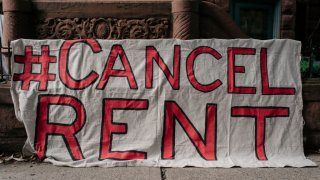
- In a summary of bipartisan legislation circulated on Wednesday, lawmakers included a national eviction moratorium until February, 2021, and $25 billion in rental assistance for tenants who've fallen behind in the pandemic.
- Housing advocates warn of a historic eviction crisis without more government intervention.
- Displaced families worsen the spread of Covid, research finds.
The next stimulus package may include relief for renters struggling in the pandemic.
In a summary of the bipartisan legislation circulated on Wednesday, lawmakers included a national eviction moratorium until February, 2021, and $25 billion in rental assistance for tenants who've fallen behind.
Those funds would be targeted at households earning 50% of the area's median income and below, and could cover up to 18 months of back rent, according to the preliminary details. State and local governments would disburse the aid.
It's not yet clear if Congress will be able to strike a deal before the end of the year, though housing advocates warn of a historic eviction crisis without more government intervention.

The Centers for Disease Control and Prevention's national eviction ban is set to expire at the end of December. More than 12 million Americans – or 1 in 6 adult renters – said in November that they're not caught up with their rent.
Money Report
Researchers have found that evictions worsen the spread of Covid.
As many as 433,700 excess cases of the virus and 10,700 additional deaths were caused by states lifting their eviction moratoriums between March and September, one recent study found.
"When you're looking at an infectious disease like Covid-19, evictions can have an impact not only on the health of evicted families, but also on the health of the broader community," said Kathryn Leifheit, one of the study's authors and a postdoctoral fellow at the UCLA Fielding School of Public Health.






